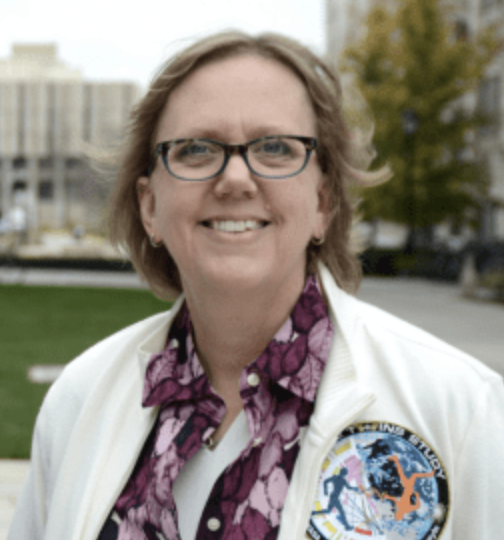Zero-G Gut: The Inner Workings Of Outer Space Research
 NASA is building a plan for Americans to set foot on the moon again, and Martha Vitaterna’s gut instincts could play a central role.
NASA is building a plan for Americans to set foot on the moon again, and Martha Vitaterna’s gut instincts could play a central role.
For the past five years, Vitaterna, deputy director of Northwestern’s Center for Sleep and Circadian Biology (CSCB), has worked closely with the space agency to reveal new insights about how space affects the thousands species of bacteria living inside the stomach and intestines — the gut microbiota — as well as their mammalian “host.”
“There’s a lot that goes into designing an experiment that will take place in near-zero gravity,” says Vitaterna. “There’s also the awe of watching astronauts float through the International Space Station and the anxiety of awaiting results to analyze when they return to Earth.”
An expert on circadian rhythms, Vitaterna — along with neurobiologist and CSCB Director Fred Turek — sought to pursue gut research with NASA following publication of a 2014 PLOS ONE article, “Circadian Disorganization Alters Intestinal Microbiota.” That study showed for the first time that while the microbiome was affected when the circadian clock — the mechanisms responsible for biological regulation of the day-night cycle in humans — was disrupted, the effects were greatly amplified by a high-fat, high-sugar, Western-style diet.
Despite the microbiota’s importance for maintaining overall health on Earth, how the rigors of spaceflight affect the gut remains unknown. Imbalances in the microbiome have been associated with several diseases and conditions, from obesity and diabetes to dementia In 2015, the Northwestern research team participated in NASA’s groundbreaking Twins Study. The unprecedented 342-day mission involved 10 parallel projects with Astronaut Scott Kelly and his Earthbound twin, Mark.
“It’s important to understand how space travel may impact the circadian system, since it coordinates so many biological processes” says Vitaterna. “The exertion of liftoff, absence of gravity, and confined living arrangement all add to the stress of life in space, and the key to adapting may be in the body’s ability to maintain harmony across systems.”
At this March’s Science Café, Vitaterna will discuss her NASA experiences, latest research results, and her next space-based project. The event takes place on March 27 from 6:30 to 8 p.m. at the Firehouse Grill, 750 Chicago Ave. in Evanston. Northwestern’s Science Café is free to attend and open to the public.
Vitaterna Receives Additional NASA Funding
NASA's Human Research Program and Space Biology Program will fund 25 proposals to help answer questions about astronaut health and performance during future long-duration missions beyond low-Earth orbit. The selected proposals will investigate biological, physiological, and behavioral adaptations to spaceflight. All of the selected projects will contribute to NASA’s long-term plans, which include human missions to the Moon and Mars. Vitaterna will study the “Impact of the Martian solar day and gravity on microbiota.”
Making the Most of an Invaluable Resource
NASA’s Biospecimen Sharing Program insures that spaceflight samples are preserved and used to maximize the scientific value returned by these difficult studies.
Turek and Vitaterna sought and obtained approval from NASA’s Space Biology to bring additional Northwestern collaborators into the scientific endeavor, to study gene expression in various organ systems:
- Phyllis Zee, neurology: brain
- Tiffany Schmidt, neurobiology: eyes
- Joseph Bass, medicine: endocrinology: pancreas and muscle
- Teresa Woodruff, obstetrics and gynecology: reproductive tract
- Lisa Wilsbacher, medicine: cardiology: heart
In addition to Vitaterna, Wilsbacher and Woodruff are also alumnae of Northwestern.
By Roger Anderson